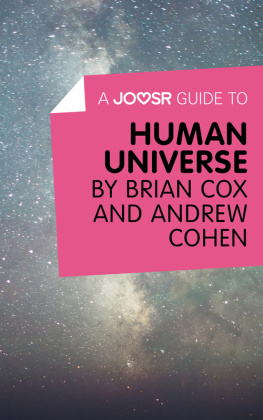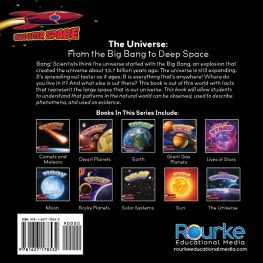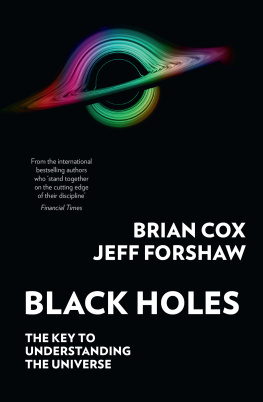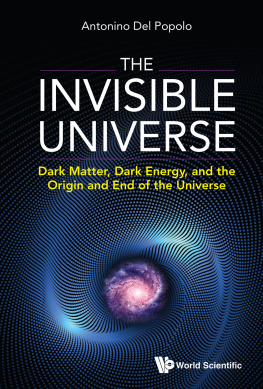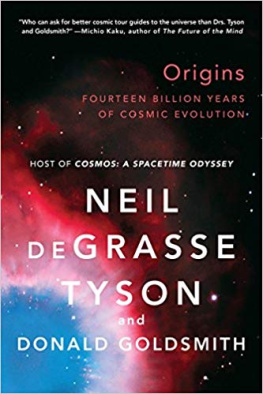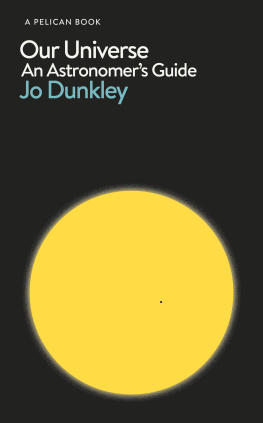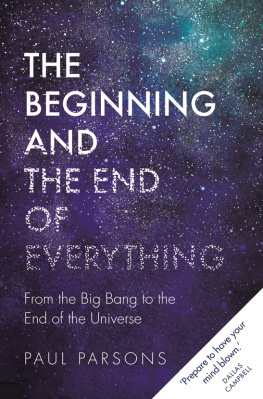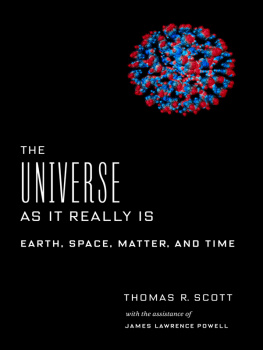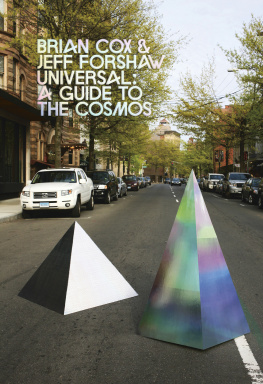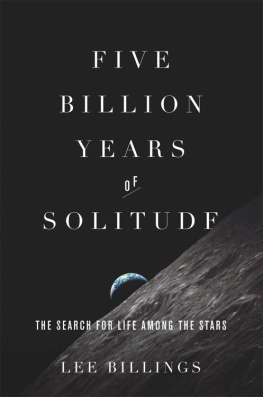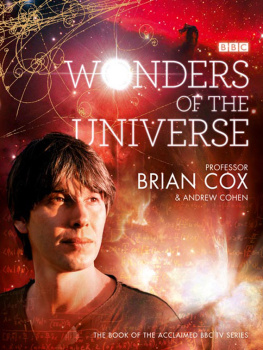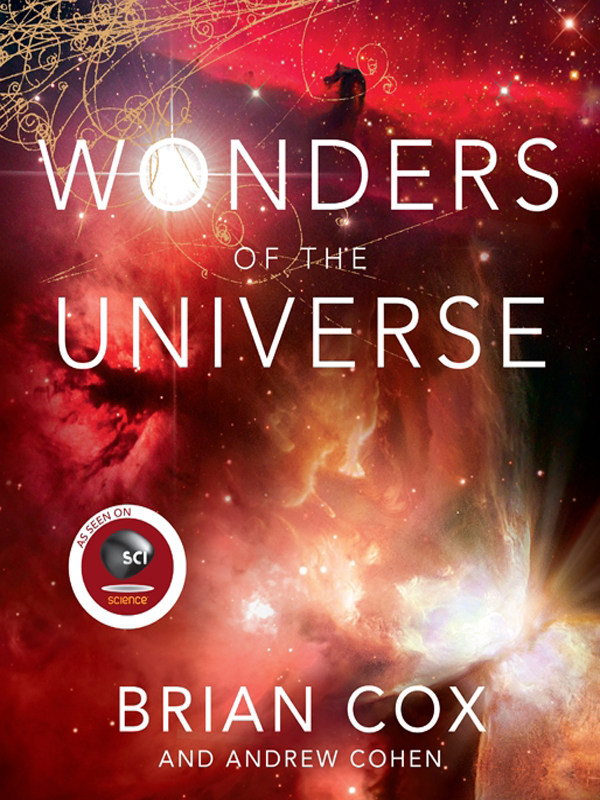
A t 13.7 billion years old, 93 billion light years across and filled with 100 billion galaxies each containing hundreds of billions of stars the Universe as revealed by modern science is humbling in scale and dazzling in beauty. But, paradoxically, as our knowledge of the Universe has expanded, so the division between us and the cosmos has melted away. The Universe may turn out to be infinite in extent and full of alien worlds beyond imagination, but current scientific thinking suggests that we need it all in order to exist. Without the stars, there would be no ingredients to build us; without the Universes great age, there would be no time for the stars to perform their alchemy. The Universe cannot be old without being vast; there may be no waste or redundancy in this potentially infinite arena if there are to be observers present to gaze upon its wonders.
The story of the Universe is therefore our story; tracing our origins back beyond the dawn of man, beyond the origin of life on Earth, and even beyond the formation of Earth itself; back to events perhaps inevitable, perhaps chance ones that occurred less than a billionth of a second after the Universe began.
AN ANCIENT WONDER
On Christmas Eve 1968, Apollo 8 passed into the darkness behind the Moon, and Frank Borman, Jim Lovell and William Anders became the first humans in history to lose sight of Earth. When they emerged from the Lunar shadow, they saw a crescent Earth rising against the blackness of space and chose to broadcast a creation story to the people of their home planet. A quarter of a million miles from home, lunar module pilot William Anders began:
We are now approaching lunar sunrise and, for all the people back on Earth, the crew of Apollo 8 has a message that we would like to send to you.
In the beginning God created the heaven and the Earth.
And the Earth was without form, and void; and darkness was upon the face of the deep. And the Spirit of God moved upon the face of the waters.
And God said, Let there be light: and there was light.
And God saw the light, that it was good: and God divided the light from the darkness.
The emergence of light from darkness is central to the creation mythologies of many cultures. The Universe begins as a void; the Maori called it Te Kore , the Greeks Chaos . The Egyptians saw the time before creation as an infinite, fathomless ocean out of which the land and the gods emerged. In some cultures, God is eternal: He created the Universe out of nothing and will outlast it. In others, such as some Hindu traditions, a vast primordial ocean predates the heavens and Earth. Lord Vishnu floated, asleep, on the ocean, entwined in the coils of a giant cobra, and only when light appeared and the darkness was banished did he awake and command the creation of the world.
We still dont know how the Universe began, but we do have very strong evidence that something interesting happened 13.75 billion years ago that can be interpreted as the beginning of our universe. We call it the Big Bang. (We must be careful with our choice of words here, because this is a book about science, and the key to good science is the separation of the known from the unknown.) This interesting thing that happened corresponds to the origin of everything we can now see in the skies. All the ingredients required to build the hundreds of billions of galaxies and thousands of trillions of suns were once contained in a volume far smaller than a single atom. Unimaginably dense and hot beyond comprehension, this tiny seed has been expanding and cooling for the last 13.75 billion years, which has been sufficient time for the laws of nature to assemble all the complexity and beauty we observe in the night skies. These natural processes have also given rise to Earth, life, and also consciousness, which in many ways is harder to comprehend than the mere emergence of the seemingly infinite stars.

The work of the space programmes across the world cannot be viewed as a luxury, but rather as a necessity.
The cosmos is about the smallest hole that a man can hide his head in.
G.K. Chesterton
Care is in order, because the very beginning by which we mean the events that happened during the Planck epoch the time period before a million million million million million million millionths of a second after the Big Bang, is currently beyond our understanding. This is because we lack a theory of space and time before this point, and consequently have very little to say about it. Such a theory, known as quantum gravity, is the holy grail of modern theoretical physics and is being energetically searched for by hundreds of scientists across the world. (Albert Einstein spent the last decades of his life searching in vain for it.) Conventional thinking holds that both time and space began at time zero, the beginning of the Planck era. The Big Bang can therefore be regarded as the beginning of time itself, and as such it was the beginning of the Universe.
There are alternatives, however. In one theory, what we see as the Big Bang and the beginning of the Universe was caused by the collision of two pieces of space and time, known as branes, that had been floating forever in an infinite, pre-existing space. What we have labelled the beginning was therefore nothing more significant than a cosmic collision of two sheets of space and time.
It may be that the question Why is there a Universe? will remain forever beyond us; it may also be that we will have an answer within our lifetimes, but the quest has to date proved more valuable than the answer because the ancient search for origins lies at the very heart of science. Indeed, it lies at the heart of much of human cultural development. The desire to understand events beyond the terrestrial seems to be innate, because all the great civilisations of antiquity have shared it, developing stories of beginnings, origins and endings. It is only recently that we have discovered that this quest is also profoundly useful in a practical sense. When coupled with the scientific method, this quest has allowed us not only to better understand nature, but to manipulate and control it for the enrichment of our lives through technology. The well-spring of all that we take for granted, from medical science to intercontinental air travel, is our curiosity.
THE VALUE OF WONDER
The idea that a journey to the edge of the Universe is deeply relevant to our everyday lives lies at the heart of Wonders of the Universe . I cannot emphasize enough my strong conviction that exploration, both intellectual and physical, is the foundation of civilisation. So whilst building rockets to the Moon and telescopes to capture the light from the most distant stars may seem like an interesting luxury, such a view would be superficial, incorrect and downright daft to borrow a phrase from my native Oldham. We are part of the Universe; its fate is our fate; we live in it and it lives in us. How can anything be more important, relevant and useful than understanding its workings?
When we began to think about the series, we wanted to make programmes that were more than a simple tour of the wonders of the Universe. Of course black holes, colliding galaxies and stars at the edge of time are fascinating, and we see them all, but to characterise the ancient science of astronomy as a spectator sport would be to miss the point. The wonders we see through our telescopes are laboratories where we can test our understanding of the natural world in conditions so extreme that we will never be able to recreate them here on Earth. With this in mind, we decided to base the programmes around scientific themes rather than the wonders themselves.


